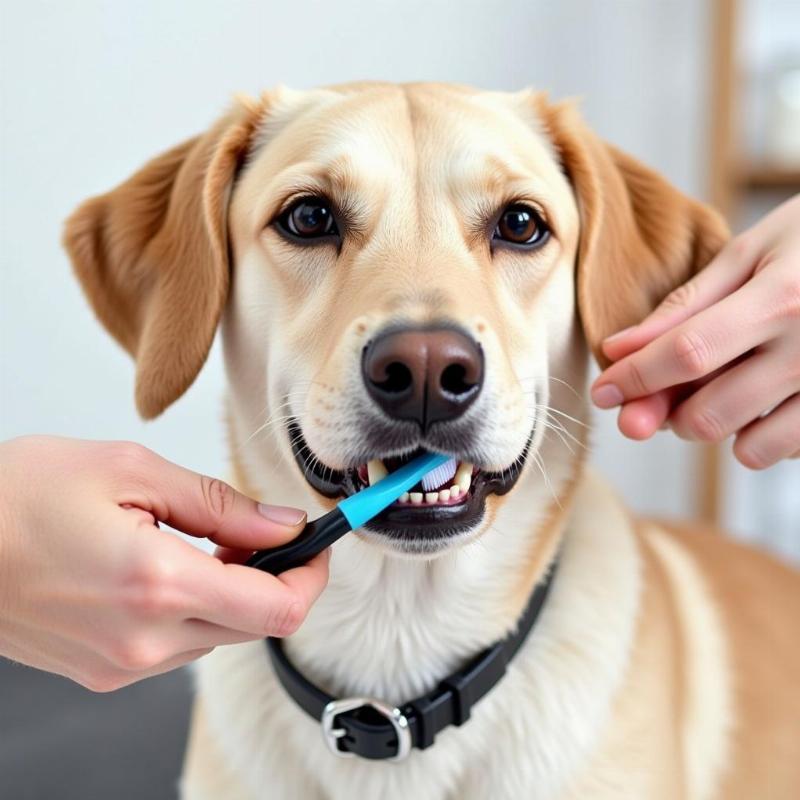Dog dental powders have become increasingly popular as a convenient way to maintain our furry friends’ oral hygiene. But do they actually work? Many pet owners are curious about their effectiveness and whether they’re a worthwhile addition to their dog’s dental care routine. This article will delve into the science behind dog dental powders, exploring their potential benefits, drawbacks, and how they compare to other dental care options available in the US market.
Understanding Dog Dental Powders and Their Ingredients
Dog dental powders typically contain a blend of ingredients aimed at improving oral health. Common components include enzymes, probiotics, natural abrasives, and breath fresheners. Enzymes, like amylase and lysozyme, help break down plaque and tartar buildup. Probiotics introduce beneficial bacteria to the mouth, potentially outcompeting harmful bacteria that contribute to gum disease. Abrasives, such as silica or calcium carbonate, mechanically help remove surface stains and debris. Finally, ingredients like parsley or peppermint oil freshen breath.
How Effective are Dental Powders for Dogs?
The effectiveness of dental powders can vary depending on the specific product and the individual dog. While they can contribute to better breath and potentially reduce plaque buildup, they are not a replacement for regular brushing. Think of them as a supplementary tool, not a standalone solution. For example, if your dog is prone to tartar buildup, a dental powder might help slow down the process, but it’s unlikely to eliminate existing tartar.
Are There Any Risks Associated with Dog Dental Powders?
Most dental powders are considered safe for dogs when used as directed. However, it’s crucial to choose a product formulated specifically for dogs and avoid those containing artificial sweeteners like xylitol, which is toxic to canines. Always check the ingredient list and consult with your veterinarian if you have any concerns about a specific ingredient or your dog’s individual health needs. Some dogs may also have allergies to certain ingredients, so start with a small amount and monitor for any adverse reactions.
Dental Powders vs. Other Dental Care Options for Dogs
In the US, there’s a wide array of dog dental care products available, from cookie cutters for dog treats to specialized chews and treats. While dental powders offer a convenient way to boost oral hygiene, they don’t replace the gold standard: brushing. Brushing with a dog-specific toothpaste is the most effective way to remove plaque and prevent dental disease. Dental chews and treats can also be helpful, particularly those approved by the Veterinary Oral Health Council (VOHC).
 Dog getting its teeth brushed
Dog getting its teeth brushed
Tips for Using Dog Dental Powder Effectively
For best results, sprinkle the recommended amount of powder onto your dog’s food once daily. Choose a powder with a flavor your dog enjoys to encourage acceptance. If your dog is hesitant, you can start by mixing a small amount with a tasty treat. Remember that dental powder is a supplement and should be used in conjunction with other dental care practices, such as regular brushing and professional cleanings.
When Should I Take My Dog to the Vet for Dental Care?
Even with diligent home care, regular veterinary dental checkups are essential. Schedule a checkup at least annually, or more frequently if your dog has a history of dental issues. Your vet can perform a thorough examination, clean your dog’s teeth professionally, and address any existing problems.
Conclusion
Dog dental powders can be a valuable addition to your dog’s oral hygiene routine, offering a convenient way to freshen breath and potentially reduce plaque buildup. However, they are not a substitute for regular brushing and professional dental care. By combining these methods, you can help ensure your furry friend maintains a healthy and happy smile. Remember to always consult with your veterinarian before making any changes to your dog’s dental care regimen.
FAQ
- Can I use human toothpaste on my dog? No, human toothpaste often contains ingredients like xylitol that are toxic to dogs.
- How often should I brush my dog’s teeth? Ideally, daily brushing is recommended.
- What are the signs of dental disease in dogs? Bad breath, red or swollen gums, difficulty eating, and excessive drooling can all be signs of dental problems.
- Are dental chews effective? Some dental chews can be effective at reducing plaque and tartar, especially those with the VOHC seal of approval.
- How much does professional dog teeth cleaning cost in the US? The cost varies depending on location and the extent of the cleaning needed but can range from $200 to $500.
- Can I give my dog blood clotting powder for dogs after a dental procedure? Always consult with your vet before giving your dog any new medication, especially after a dental procedure.
- Where can I find mobile nail trimming for dogs services? Many mobile grooming services offer nail trimming; check online directories or ask your vet for recommendations.
Beautdogs.us is your premier resource for all things dog-related in the US. We offer expert advice on dog breeds, care, grooming (grooming table for small dogs), and products (dog nail clippers with quick sensor). Whether you’re a seasoned dog owner or just starting out, Beautdogs.us provides the trusted information you need to ensure your furry friend lives a happy, healthy life. Contact us today at [email protected] or +1 501-555-7529.